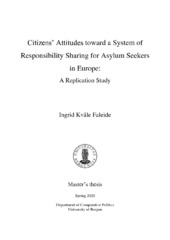| dc.description.abstract | Four years after the unprecedented influx of refugees to Europe in 2015/2016, Europe still only has temporary solutions for refugee protection. The current regulations of the Common European Asylum System are not capable of handling another influx of refugees like that of 2015/2016. The negotiations for a reform have stagnated, despite ongoing debate since 2016. Asylum seekers keep crossing the Mediterranean, and in pursuit of solutions, political tension appears strong. A series of studies of citizen’s reactions to the refugee crisis in Europe have documented an increase in demands for restrictions and border controls. But beyond immediate reactions, much remains unknown about citizen preferences over specific asylum policies. The research question posed here is: Do citizens support a European system of responsibilitysharing for the reception of asylum applicants even if that means accepting more applicants? A study conducted in 15 European countries in the early spring of 2016 found broad-based support for responsibility-sharing of asylum seekers. The purpose of this thesis is to test if that finding replicates. A tougher test of the original study is possible through within-country comparison in a context where the situation concerning asylum seekers has changed substantially. This contextual change is utilized with the objective of extending the knowledge introduced by the original authors. The replication data was collected through a survey experiment in the Norwegian Citizen Panel Wave 16 (fall 2019). How citizens make the tradeoff between responsibility-sharing and accepting more applicants to their country, is determined through a set of randomly assigned manipulations. Comparison of cross-national data collected in 2016 and data collected among Norwegian respondents in 2019, show that the number of received asylum applications is important when citizens form their preferences, but responsibility-sharing is decisive for the majority of citizens. The data collected for this thesis successfully replicated the findings from the original study. The conclusion is that citizens still support a European system of responsibility sharing for the reception of asylum applicants even if that means accepting more applicants. | en_US |
